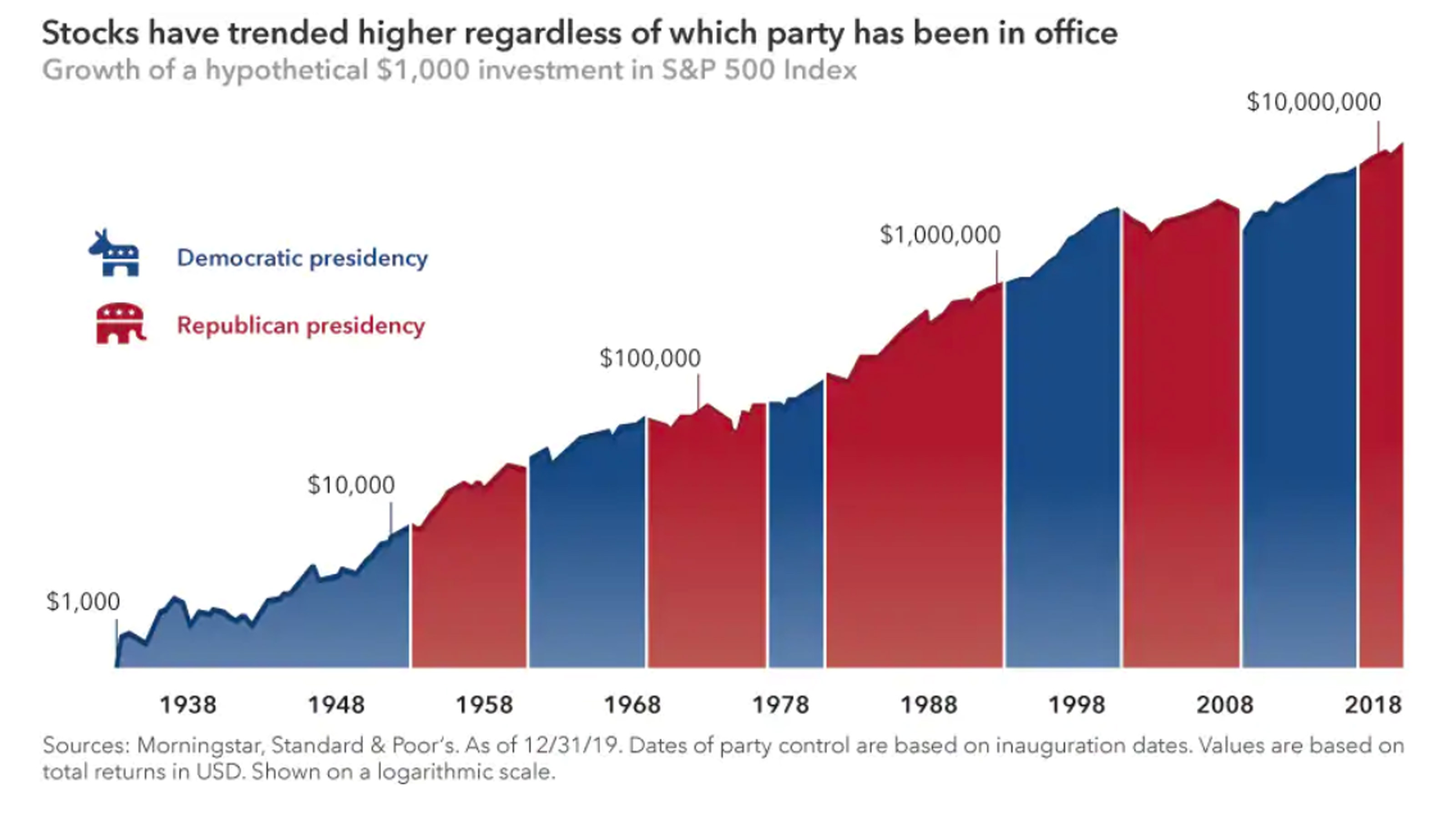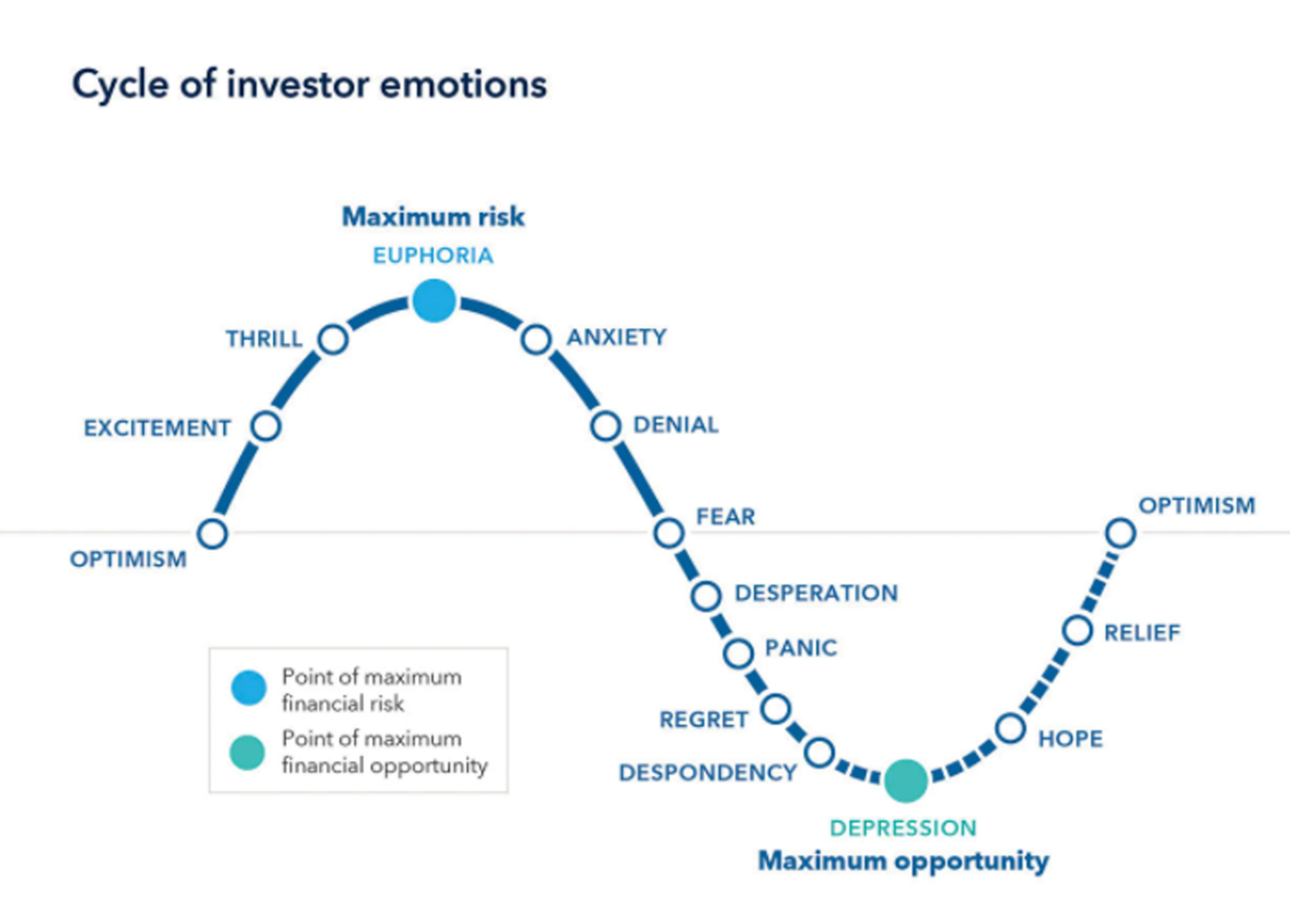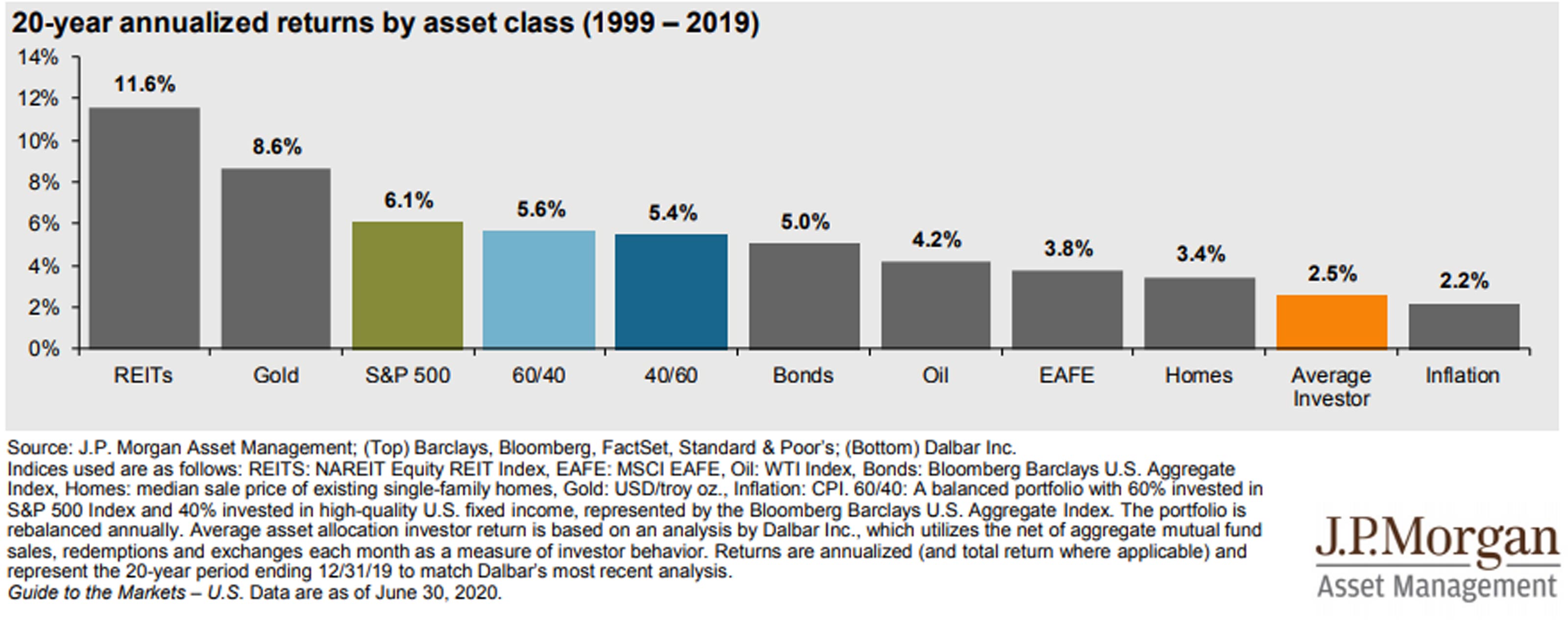What Does the Upcoming Election Mean to Your Investments?
For smart investors, the surprising answer may be very little. Here’s why, and what you should do (and not do) as election season heats up.


Profit and prosper with the best of Kiplinger's advice on investing, taxes, retirement, personal finance and much more. Delivered daily. Enter your email in the box and click Sign Me Up.
You are now subscribed
Your newsletter sign-up was successful
Want to add more newsletters?

Delivered daily
Kiplinger Today
Profit and prosper with the best of Kiplinger's advice on investing, taxes, retirement, personal finance and much more delivered daily. Smart money moves start here.

Sent five days a week
Kiplinger A Step Ahead
Get practical help to make better financial decisions in your everyday life, from spending to savings on top deals.

Delivered daily
Kiplinger Closing Bell
Get today's biggest financial and investing headlines delivered to your inbox every day the U.S. stock market is open.

Sent twice a week
Kiplinger Adviser Intel
Financial pros across the country share best practices and fresh tactics to preserve and grow your wealth.

Delivered weekly
Kiplinger Tax Tips
Trim your federal and state tax bills with practical tax-planning and tax-cutting strategies.

Sent twice a week
Kiplinger Retirement Tips
Your twice-a-week guide to planning and enjoying a financially secure and richly rewarding retirement

Sent bimonthly.
Kiplinger Adviser Angle
Insights for advisers, wealth managers and other financial professionals.

Sent twice a week
Kiplinger Investing Weekly
Your twice-a-week roundup of promising stocks, funds, companies and industries you should consider, ones you should avoid, and why.

Sent weekly for six weeks
Kiplinger Invest for Retirement
Your step-by-step six-part series on how to invest for retirement, from devising a successful strategy to exactly which investments to choose.
Investing during an election year comes with a special kind of risk. Your mind is on sharp alert. The very nature of politics and your nest egg can spark emotions that may drive you to make decisions in the short term that could have a negative impact on your long-term goals.
Consider taking a step back to “pause” and set aside your emotions and bias, keeping your long-term perspective in mind. Ponder the three ideas below as we move closer to the election.
1. Stop worrying about which party is going to win.
No matter who you believe to be the best fit, investors can create unneeded anxiety if they spend too much energy on the election results — and that can lead to irrational behaviors. In fact, historically speaking, elections have made very little impact over long-term investment returns. As Capital Group economist Darrell Spence says, “There are many other variables that determine economic growth and market returns and, frankly, presidents have very little influence over them.”
From just $107.88 $24.99 for Kiplinger Personal Finance
Become a smarter, better informed investor. Subscribe from just $107.88 $24.99, plus get up to 4 Special Issues

Sign up for Kiplinger’s Free Newsletters
Profit and prosper with the best of expert advice on investing, taxes, retirement, personal finance and more - straight to your e-mail.
Profit and prosper with the best of expert advice - straight to your e-mail.
The graphic below shows that over the years, staying invested and avoiding the temptation to let emotions drive financial decisions has delivered the best overall outcome for investment portfolios. Keep in mind, past performance results are not indicative of future performance, thus, market consequences exist regardless of your favorite party or candidate to your overall performance and returns in the long run.

2. Don’t be surprised to see volatility increasing as we near the election: Expect it.
When volatility happens and it is your personal retirement account or your children’s college tuition fund at stake, it may be very difficult to sit and watch. Taking action may make you feel better during times of crisis, but in actuality sometimes the best advice is to do nothing.
Most people are not analyzing statistical algorithms and charts to determine what decisions they should make. In the real world, our emotions influence our decision-making process. We, as investors, should expect volatility in the markets, as it is a normal characteristic to long-term investing.
The critical takeaway is this: Stay the course. Expect to see rough patches, headlines and bad news — there will always be a flavor of the day when it comes to “financial noise.” Behavioral finance research shows that the average investor tends to buy high and sell low as a result of being pulled into the financial noise and making emotionally driven bad decisions. Capital Group created the graphic below “Cycle of investor emotions,” can you relate?

3. Do not be tempted to time the market during election season. It’s time in the market, not timing the market!
Peter Lynch, former fund manager with Fidelity Investments, is arguably one the most successful investors of all time. Peter is famously quoted as saying “Far more money has been lost by investors trying to anticipate corrections, than lost in the correction themselves.” Between 1977 and 1990, Lynch’s fund averaged an approximate 29% annual rate of return, which more than doubled the S&P 500 index, making it the best-performing fund in the world during that time.
Given this remarkable track record, you might be shocked to learned that the average investor in the fund actually lost money! What? How! The most obvious answer is that withdrawals from retail investor accounts increase during uncertain times, and as the markets recover most believe that it is a good time to start buying back those shares which were sold. In essence, average investors are selling low and buying high instead of just staying the course.
JP Morgan’s “Diversification and the average investor” chart below may beg the question of staying the course. As you can see, the average investor’s rate of return is barely beating inflation…

In closing, expect a sensational election season, along with volatility and the temptation to try to time the markets. We suggest you meet with your financial adviser to review your asset allocation, investment risks, and to specifically stress test your portfolio against your lifestyle goals and desires.
We welcome you to visit our website (www.mycgcapital.com) to start a conversation. Regardless of your investment strategy, remain grounded with clarity and confidence that this too shall pass.
Profit and prosper with the best of Kiplinger's advice on investing, taxes, retirement, personal finance and much more. Delivered daily. Enter your email in the box and click Sign Me Up.

Dennis D. Coughlin, CFP, AIF, co-founded CG Capital with Christopher C. Giambrone in 1999. He has been in practice since 1996 and works with individuals nearing retirement and those whom have already retired. Proud of his humble upbringing, Dennis shares his advice with the same core principles that he was raised with. When not in the office, you will find him with his family enjoying the outdoors.
-
 Dow Adds 1,206 Points to Top 50,000: Stock Market Today
Dow Adds 1,206 Points to Top 50,000: Stock Market TodayThe S&P 500 and Nasdaq also had strong finishes to a volatile week, with beaten-down tech stocks outperforming.
-
 Ask the Tax Editor: Federal Income Tax Deductions
Ask the Tax Editor: Federal Income Tax DeductionsAsk the Editor In this week's Ask the Editor Q&A, Joy Taylor answers questions on federal income tax deductions
-
 States With No-Fault Car Insurance Laws (and How No-Fault Car Insurance Works)
States With No-Fault Car Insurance Laws (and How No-Fault Car Insurance Works)A breakdown of the confusing rules around no-fault car insurance in every state where it exists.
-
 For the 2% Club, the Guardrails Approach and the 4% Rule Do Not Work: Here's What Works Instead
For the 2% Club, the Guardrails Approach and the 4% Rule Do Not Work: Here's What Works InsteadFor retirees with a pension, traditional withdrawal rules could be too restrictive. You need a tailored income plan that is much more flexible and realistic.
-
 Retiring Next Year? Now Is the Time to Start Designing What Your Retirement Will Look Like
Retiring Next Year? Now Is the Time to Start Designing What Your Retirement Will Look LikeThis is when you should be shifting your focus from growing your portfolio to designing an income and tax strategy that aligns your resources with your purpose.
-
 I'm a Financial Planner: This Layered Approach for Your Retirement Money Can Help Lower Your Stress
I'm a Financial Planner: This Layered Approach for Your Retirement Money Can Help Lower Your StressTo be confident about retirement, consider building a safety net by dividing assets into distinct layers and establishing a regular review process. Here's how.
-
 The 4 Estate Planning Documents Every High-Net-Worth Family Needs (Not Just a Will)
The 4 Estate Planning Documents Every High-Net-Worth Family Needs (Not Just a Will)The key to successful estate planning for HNW families isn't just drafting these four documents, but ensuring they're current and immediately accessible.
-
 Love and Legacy: What Couples Rarely Talk About (But Should)
Love and Legacy: What Couples Rarely Talk About (But Should)Couples who talk openly about finances, including estate planning, are more likely to head into retirement joyfully. How can you get the conversation going?
-
 How to Get the Fair Value for Your Shares When You Are in the Minority Vote on a Sale of Substantially All Corporate Assets
How to Get the Fair Value for Your Shares When You Are in the Minority Vote on a Sale of Substantially All Corporate AssetsWhen a sale of substantially all corporate assets is approved by majority vote, shareholders on the losing side of the vote should understand their rights.
-
 How to Add a Pet Trust to Your Estate Plan: Don't Leave Your Best Friend to Chance
How to Add a Pet Trust to Your Estate Plan: Don't Leave Your Best Friend to ChanceAdding a pet trust to your estate plan can ensure your pets are properly looked after when you're no longer able to care for them. This is how to go about it.
-
 Want to Avoid Leaving Chaos in Your Wake? Don't Leave Behind an Outdated Estate Plan
Want to Avoid Leaving Chaos in Your Wake? Don't Leave Behind an Outdated Estate PlanAn outdated or incomplete estate plan could cause confusion for those handling your affairs at a difficult time. This guide highlights what to update and when.